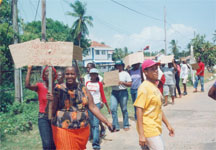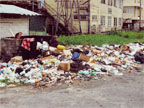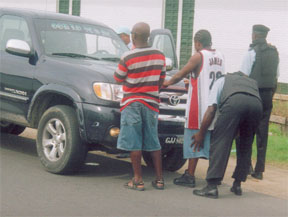Life for many ordinary Guyanese in 2009 has not been very kind. Official statements have warned of dangerous developments and international reports, invariably, have been critical of the administration’s record of governance
Citizens’ sense of satisfaction and safety are intangibles which depend only partially on physical infrastructure. Bridges and buildings are insufficient to guarantee feelings of fulfillment if citizens fear that they would be discriminated against or treated unfairly. The state is obliged to have, as its primary goal, the preservation of the people’s vital freedoms and their protection from critical and pervasive threats and situations.
How satisfied were citizens that their quality of life was assured and that the systems needed to ensure their ability to live in dignity were safeguarded in 2009?
Human Development
The most recent United Nations Development Programme Human Development Report − issued under the theme ‘Overcoming Barriers: Human Mobility and Development’ and released in October − indicated that Guyana, disappointingly, has maintained its overall 114th place in the world. It remained at the same position as in 2006. By comparison, Barbados, another CARICOM country that also gained its independence in 1966, was ranked 77 places higher at 37th.

The Report assesses the average achievements in a country in three basic dimensions − a long and healthy life, as measured by life expectancy at birth; access to knowledge, as measured by the adult literacy rate and the combined gross enrolment ratio in education; and a decent standard of living, as measured by Gross Domestic Product per capita in purchasing power parity.
Another report − Internationally Recognised Core Labour Standards in Guyana − which was issued by the International Trade Union Confederation and released in Brussels in July this year, shook both the Minister of Labour, Human Services and Social Security Manzoor Nadir and Minister of Education Shaikh Baksh. The Report stated: “…the government’s efforts to cope with child labour and enforce compulsory education are inadequate, given that the problem concerns at least one fifth of Guyanese children. Many children are engaged in hazardous work, and child prostitution is one of Guyana’s worst forms of child labour. The law on child labour could protect children, but it is not enforced effectively.”
The Report added that “Child labour in informal activities is a serious problem and very young children are engaged in street vending. Apart from street vendors, children are usually found as porters, domestic servants, wait staff in bars and restaurants and vendors in shops. There are reports of children found working in mining, logging, farming, fishing, and manufacturing industries doing possibly hazardous work and conducting illicit drug trade and prostitution.”

Several studies, according to the Report, identified child prostitution as one of the worst forms of child labour in Guyana. A 1996 UNICEF survey answered by pupils, for example, revealed that 26 per cent and 17 per cent of the respondents knew female and male students respectively who “accepted returns in exchange for sexual favours.” The study concluded that there is “an alarming degree of prostitution within the Guyanese secondary school system.”
Although he acknowledged that there are cases of child labour in the country, Nadir queried the factual basis of the Report, accusing the authors − the ITUC − of failing to do proper research and of depending heavily on the views of the GTUC.
Baksh also rejected the Report. He felt that its conclusion that there was an “alarming degree of prostitution” in local secondary schools was not based on proper scientific research. He said that the ITUC findings were contradicted by those of his Ministry which had conducted its own surveys and found only three cases of prostitution in the schools identified.
Human Rights
A dark cloud seems to be permanently overshadowing the rights of citizens. The United States Department of State’s Report on Human Rights Practices issued by the Bureau of Democracy, Human Rights, and Labor and the Trafficking in Persons Report, issued by the Office to Monitor and Combat Trafficking in Persons, repeated their annual criticisms of the administration’s performance.

In the Report on Human Rights Practices released in February, the most significant abuses included “potentially unlawful killings by police [and] mistreatment of suspects and detainees by the security forces,” among others. In this regard, the evidence suggested that both the Guyana Police Force and the Guyana Prison Service committed unlawful killings. In most cases the police reportedly shot the victims “while attempting to make an arrest or while a crime was being committed.”
On some occasions, detainees have died in police custody. The recent allegations that a teenager was tortured by members of the Police Force on the West Coast Demerara indicate that cruelty might already be endemic in police interrogation techniques.
The Trafficking in Persons Report placed Guyana on Tier 2. In explaining its rationale for Guyana’s unfavourable ranking, the US emphasised not the number of cases recorded but the effort evinced to eradicate trafficking. The Report stated clearly “While the government has undertaken a commendable initiative to increase public awareness of the dangers of human trafficking through a nationwide outreach campaign and advertising of its anti-trafficking hotline, Guyana is placed on Tier 2 Watch List for a second consecutive year for failing to provide evidence of increasing efforts to combat trafficking, particularly in the area of law enforcement actions against trafficking offenders.”
The administration reserved its fiercest criticism for the Report on Promotion and Protection of All Human Rights, Civil, Political, Economic, Social and Cultural Rights, Including the Right to Development by the United Nations Expert on Minority Issues. The administration rejected the Report almost entirely.
This Report addressed five main areas of concern − Employment and economic activity; Land and housing; Access to justice; Media; Protection against violence; and, Identity, language and Culture and religion. The Report suggested that many members of one of the country’s larger minority groups − the African-Guyanese − feel that they are systematically discriminated against. That perception springs from several sources. The incontrovertible evidence is that a disproportionately large number of African-Guyanese have been the target of “serious rights violations…including arbitrary detention without trial, torture, deaths and mistreatment in custody, and killings of innocent civilians.”
The Report added that the perception was widespread that there was a systematic effort to exclude African-Guyanese as an ethnic group from positions of influence, power or economic status. It pointed to a growing “resistance movement” among African-Guyanese in response to exclusion and discrimination. It warned that moderate voices were increasingly being drowned out by more radical elements and racially divisive opinions.
The 2009 Transparency International Corruption Perception Index released in November ranked Guyana among the most corrupt countries in the world. In a survey of 180 countries, Guyana was ranked 126 for the second straight year, with a score of 2.6 out of 10. The country is again the lowest ranked English-speaking Caribbean nation on the list.
Local reports have also been critical of daily life in Guyana. Priya Manickchand, Minister of Human Services, complained that, two of every three women were victims of domestic violence, based on research conducted in 1988. “Today,” she added, we see headlines of women beaten, raped, murdered [and] battered.” The indications are that domestic violence − physical or psychological abuse − is becoming more pervasive.
No one seems to know for sure about the extent of the domestic violence problem. Help and Shelter, a non-governmental organisation, reported handling 468 abuse cases, including child, spousal, non-spousal, and other domestic abuse in 2008. Of these, 306 involved spousal abuse directed against women. At the end of last year, the Police Force confirmed that it had received and investigated 2,811 reports of domestic violence in the policing divisions throughout the country. There is no reason to believe that the reports for 2009 will be different.
Public health
Minister of Health Dr Leslie Ramsammy acknowledged openly that the health sector over which he has responsibility has seriously overlooked the problem of suicide and its consequent impact on development. Suicide, he said, significantly affects the sector here even though it is a preventable public health problem. He pointed out that Guyana’s suicide rate was approximately 20-25 per 100,000 population and it has been consistent for years.
Suicide has also been ranked seventh of the ten major causes of death in Guyana for years, averaging around 200 deaths annually. Statistics from the Ministry of Health’s Suicide Surveillance Unit revealed that suicide deaths were 201 in 2003; 186 in 2004; 171 in 2005; 202 in 2006; and 186 in 2007.
As for disease, Ramsammy also warned that, with 424 dengue cases recorded for the year 2009, a serious outbreak was likely unless citizens take responsibility to keep their environment clean. He stated, “We will have an outbreak, I am cautioning people, we will have it unless we begin to do something.” He said while there were cases that were not being recorded, there is a “genuine increase.”
Ramsammy disclosed also that, of the 6,000-odd deaths Guyana experiences every year, road accidents are the seventh leading cause, the same ranking as suicide. Minister of Home Affairs, Clement Rohee lamented the reckless manner in which many motorists drive, deeming as unacceptable the deaths of more than 600 persons during the period 2006 to September 2009.
Although that figure represented the numbers killed, hundreds more have suffered by having been injured, crippled or disfigured in serious road accidents during that period. Up to September this year, more than 300 persons were injured in serious accidents.
The disposal of solid waste has been a public health disaster for much of South Georgetown where the Mandela Landfill has been a running sore for over a decade. Recent outbreaks of fire generated a heavy cloud of smoke as well as a strong stench. Residents have complained about respiratory problems among children forcing them to close up their houses in the evenings. Fires at the Mandela landfill had been a burning issue. The situation became so bad that persons living close to the site were instructed to evacuate their homes during September last year when the recent spate of eruptions began.
Official remedies
Indeed, 2009 has been an unnecessarily unpleasant year. But something is being done, particularly by the state, to enhance the quality of life of the most vulnerable citizens.
The Ministry of Labour, Human Services and Social Security has handed out thousands of school uniform vouchers. These are aimed at ensuring that nursery and primary school children living in difficult circumstances, at the very least, are given an equal opportunity at education by being given a new uniform for each school year. Over 30,000 children are expected to benefit from the Uniform Voucher Assistance Programme in 2009.
In order to reduce illiteracy in schools, the administration has also extended existing programmes − such as the school text books and the school-feeding programme − or has introduced new programmes which encouraged more children, especially in hinterland areas, to attend school.
Former street children have been housed at the Drop-in Centre on Hadfield Street from which they can enter training programmes aimed at building self-esteem, equipping them with life skills and preparing them to be reintegrated with their families. Homeless adults living on the streets can seek refuge at the Night Shelter in La Penitence.
These are all important short-term measures aimed at alleviating the distress caused by poverty. Long-term problems such as human rights violations and police brutality, however, will not respond to these palliatives.
There was no indication in 2009 that the administration has a strategy to implement the sort of policy changes that would make 2010 a happier year to live in Guyana.





